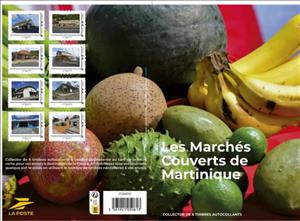Mini Sheet: Martinique Covered Markets (France 2024)
Martinique Covered Markets (France 2024)
03 June (France ) within release Collector : Martinique Covered Markets goes into circulation Mini Sheet Martinique Covered Markets face value 8*Lettre No Face Value
| Mini Sheet Martinique Covered Markets in catalogues | |
|---|---|
| Colnect codes: | Col: FR-COLL 2024-16 |
Mini Sheet is square format.
Also in the issue Collector : Martinique Covered Markets:
- Stamp - Fort-de-France face value Lettre;
- Stamp - La Diamant face value Lettre;
- Stamp - La Francais face value Lettre;
- Stamp - La Lamentin face value Lettre;
- Stamp - La Trinite face value Lettre;
- Stamp - Le Marin face value Lettre;
- Mini Sheet - Martinique Covered Markets face value 8*Lettre;
- Stamp - Saint-Esprit face value Lettre;
- Stamp - Saint-Pierre face value Lettre;
Mini Sheet Martinique Covered Markets it reflects the thematic directions:
In botany, a berry is a fleshy fruit without a drupe (pit) produced from a single flower containing one ovary. Berries so defined include grapes, currants, and tomatoes, as well as cucumbers, eggplants (aubergines), persimmons and bananas, but exclude certain fruits that meet the culinary definition of berries, such as strawberries and raspberries. The berry is the most common type of fleshy fruit in which the entire outer layer of the ovary wall ripens into a potentially edible "pericarp". Berries may be formed from one or more carpels from the same flower (i.e. from a simple or a compound ovary).: 291 The seeds are usually embedded in the fleshy interior of the ovary, but there are some non-fleshy exceptions, such as Capsicum species, with air rather than pulp around their seeds.
n economics, a market is a composition of systems, institutions, procedures, social relations or infrastructures whereby parties engage in exchange. While parties may exchange goods and services by barter, most markets rely on sellers offering their goods or services (including labour power) to buyers in exchange for money. It can be said that a market is the process by which the prices of goods and services are established. Markets facilitate trade and enable the distribution and allocation of resources in a society. Markets allow any tradeable item to be evaluated and priced. A market emerges more or less spontaneously or may be constructed deliberately by human interaction in order to enable the exchange of rights (cf. ownership) of services and goods. Markets generally supplant gift economies and are often held in place through rules and customs, such as a booth fee, competitive pricing, and source of goods for sale (local produce or stock registration).


